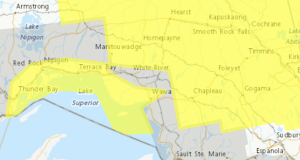 A wild bird in Wawa recently tested positive for West Nile virus (WNv). WNv has been identified in birds, mosquitoes, horses and humans in Ontario since the summer of 2001. This result indicates the presence of WNv in Algoma and the potential risk to its residents during peak mosquito season.
A wild bird in Wawa recently tested positive for West Nile virus (WNv). WNv has been identified in birds, mosquitoes, horses and humans in Ontario since the summer of 2001. This result indicates the presence of WNv in Algoma and the potential risk to its residents during peak mosquito season.
WNv is spread to humans through the bite of an infected mosquito. A mosquito becomes infected by biting a bird that carries the virus. WNv is mostly a disease of birds but can spread to humans by mosquitoes that have fed on both birds and humans. The virus is not known to spread from person-to-person, nor directly from bird-to-person. The risk of becoming infected with WNv in Algoma is low but it is still important to do the following to help protect yourself from mosquito bites:
- Wear light-coloured clothing when outdoors – mosquitoes are attracted to darker colours
- Wear tightly woven but loose-fitting clothing – mosquitoes can still bite through thin clothing
- Wear long-sleeved shirts, long pants, socks and shoes when outdoors to protect exposed skin
- Apply an approved mosquito repellent and follow the manufacturer’s instructions for use
- Limit time outdoors from dusk (sunset) to dawn (sunrise) when mosquitoes are most active
- Repair or replace screens on windows and doors to avoid mosquitoes entering your home
- Remove standing water from your property where mosquitoes can breed
Most people who contract West Nile virus will not feel any symptoms. About 1 in 5 people infected may experience mild illness including fever, headache, body ache, nausea, vomiting and rash on the chest, stomach or back. Severe symptoms are rare and are more likely to develop in older individuals and those who are immunocompromised. Severe symptoms can include muscle weakness, stiff neck, confusion, tremors, numbness and sudden sensitivity to light. Symptoms usually develop between two to fifteen days after being bitten by an infected mosquito. If you think you may have contracted West Nile virus, contact your health care provider.
Algoma Public Health does not accept dead birds. If you find a dead bird on your property, you can contact the Canadian Wildlife Health Cooperative to learn more about their surveillance and submission programs.
- Thrift Shop Thanks the Community - February 24, 2026
- Bus Cancellations (Wawa, White River & Dubreuilville) - February 24, 2026
- Chiefs of Ontario Urges Immediate Action on Highway Safety After String of Fatal Collisions - February 23, 2026
 Wawa-news.com Local and Regional News
Wawa-news.com Local and Regional News

